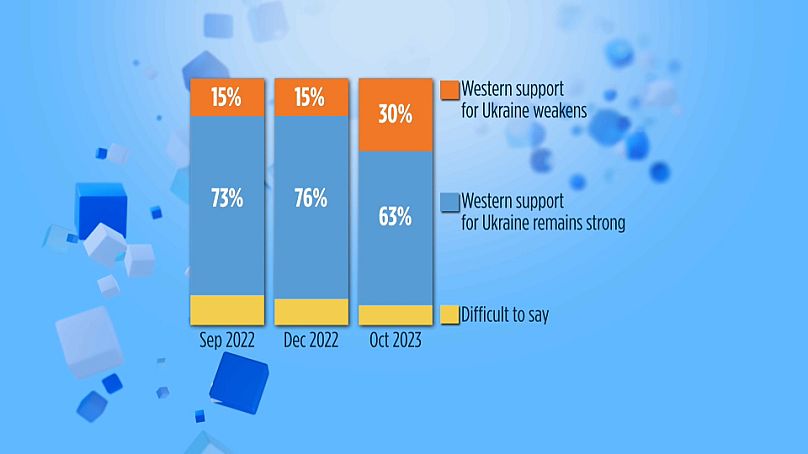The US and its allies have provided financial and military aid to Kyiv since Russia's full-scale invasion of Ukraine began and promised to support the war-ravaged country for as long as is necessary but the Kremlin claims Western sympathy is in limited supply.
According to an October poll conducted by the Kyiv International Institute of Sociology, twice as many Ukrainians believe that the West is tired of war and wants the capital to negotiate a deal with Moscow.
In the new survey, Ukrainian sociologists discovered how the country's population really feels about one of the Kremlin's main propaganda narratives - "the West is tired of war".
The share of Ukrainians who believe support from allies is waning increased from 15 per cent to 30 per cent compared to September and December last year.
The theory of "Western fatigue" was recently reiterated by Russian presidential spokesman Dmitry Peskov.
"We repeatedly said earlier that, according to our forecasts, fatigue from this conflict, fatigue from the completely absurd sponsorship of the Kyiv regime will grow in various countries, including the United States," Peskov said in early October.
Most people in Ukraine - more than 60 per cent - remain convinced that Western support is strong, and as experts believe, is unlikely to weaken in the coming months.
"President Biden has another seven months to continue to support Ukraine, and he has stated that. The United States is providing Ukraine with a serious weapons system. So this will certainly continue," said Judy Dempsey from the Carnegie Europe Centre and editor-in-chief of the Strategic Europe blog.
According to Dempsey, Brussels' support for Kyiv has remained unwavering since February 2022, the start of the full-scale Russian invasion. The EU is ready to continue providing financial, political and military assistance to Kyiv.
"The sense that the war has gone on long enough is out there among the member states, but it's not deep enough and wide enough to actually see it, to come to the point where Europeans say, enough is enough, let's negotiate," the expert noted.
Ukraine's defeat in the war against Russia could seriously affect the security structure in Europe in the future, says Maximilian Hess, a researcher at the American Institute for Foreign Policy Studies, and author of the book 'Economic War. Ukraine and the Global Conflict between Russia and the West'.
"It's so important to have a good understanding of what's at stake in the conflict, which isn't just the future security order of Europe and the potential for more Russian aggression but is also around the economic and political systems that Ukrainians are fighting for the reform of and fighting to join together with their European neighbours. This is a conflict worth supporting Ukraine in because the alternative in which Putin wins and destroys that country will lead not only to a shattering of the European security paradigm but the political and economic paradigm across Europe as well" Hess said.
According to the expert, in the coming months, Ukrainians should not worry about financial assistance significantly reducing or disappearing altogether.
"I think that the European Union has quite wisely laid out long-term aid support on both fronts that will last for quite some time, many years in terms of the future and how it's been structured already. In the United States, I do expect there to be some more political fighting around support. But I certainly think at least through the election next year, at the beginning of November 2024, that support will remain strong and continue to be forthcoming once the U.S. gets past its own domestic political crisis" he confessed.
"There is no possibility of ending the war any time soon."
Russia's full-scale assault on its former Soviet neighbour is entering its second winter. Neither Kyiv nor Moscow are now ready to sit down at the negotiating table, insisting on their own terms.
The Kremlin says that "the special operation will continue until its goals are achieved but the Ukrainian leadership does not consider dialogue possible "as long as occupation troops are on the territory of the country."
"We are not even thinking about territorial compromises. For Ukraine there is no difference between the Donetsk region and the Lviv region, the Chernihiv region and Crimea, Kyiv or Sevastopol," reminded Ruslan Stefanchuk, chairman of the Verkhovna Rada, speaking at the international conference 'Crimea Global. Understanding Ukraine through the South'.
"At the moment, I don't see this war ending because the Ukrainians are not prepared, and I can understand this completely, to negotiate any kind of agreement that would actually make their territorial integrity absolutely impossible to achieve," said Judy Dempsey.
"And we've seen all of the messages and communiques coming out of the Kremlin that they're not in a position to negotiate. It does beg the question, if neither side is not willing to negotiate and if the war drags on and more people are killed and more refugees have to leave their homes, one wonders, is there any kind of outside interlocutor that can actually bring the two sides together? It's not apparent at the moment"
Peace can only be achieved when the people in power in Russia can no longer continue the war, Maximilian Hess concluded
"I don't see any possibility to end the war anytime soon because Vladimir Putin has not indicated any interest in ending the war. Russian propaganda continues to be full of discussions around what apartments will be awarded to Russian soldiers in Odesa in the southwest, and Kyiv in central Ukraine. The reality is that it is the Kremlin that started this war for the first time in 2014 and launched into a full-scale war in 2022. And peace is only possible when Vladimir Putin's Kremlin is either no longer able to or no longer willing to engage in the fight.












